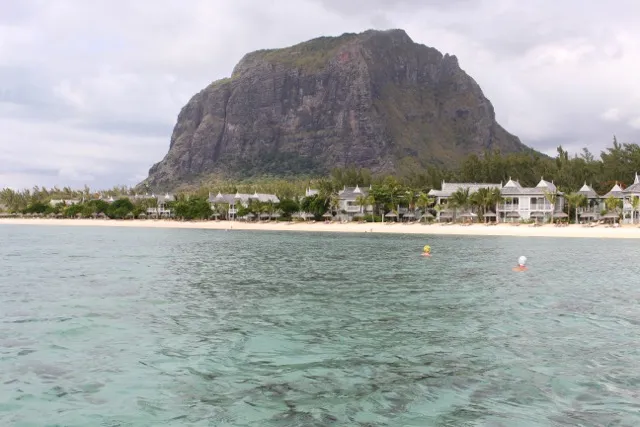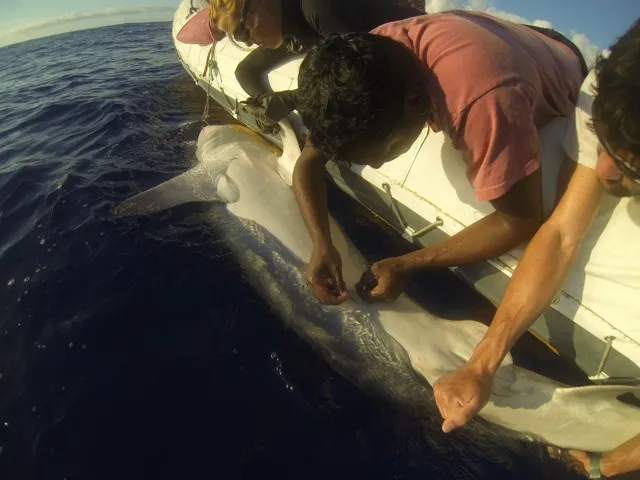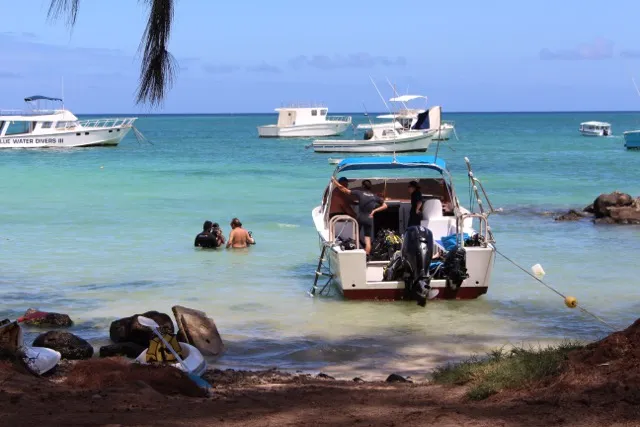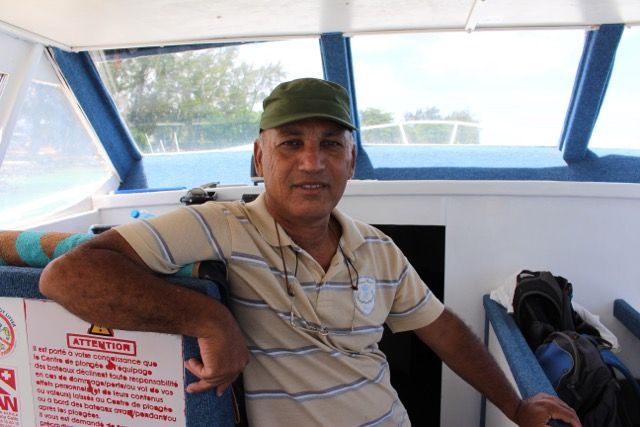Why Is This Indian Ocean Island a Hot Spot for Shark Attacks?
La Réunion has seen way more attacks than its neighbor Mauritius, and scientists are struggling to figure out why
/https://tf-cmsv2-smithsonianmag-media.s3.amazonaws.com/filer/03/b7/03b75901-e423-468a-9301-bc3e7ec51348/bullshark_in_estuary__18b.jpeg)
On a tropically warm day in November, French, South African and German tourists took to the aquamarine waves at the Lux* resort in the southwest of Mauritius, a booming Indian Ocean tourist destination. Besides the simple joy of basking in 77-degree water, the program offered by the posh resort included snorkeling, scuba diving, kitesurfing and swimming with the dolphins.
Meanwhile, in Mauritius's nearest island neighbor La Réunion, very few people do more than dip a toe in the water. Swimming and surfing are banned on La Réunion in all but a few places because of a fear of shark attacks.
Since 2011 there have been 18 shark attacks resulting in 7 deaths in La Réunion, where citizens, fishers and politicians have begun discussing the relative merits of a large-scale shark cull. Meanwhile, the last unprovoked human-shark confrontation recorded in Mauritius took place in the 1980s, and the island is now joining the ranks of those calling for tighter shark conservation rules.
Any concerns about sharks raised by tourists on Mauritius are invariably answered by a version of this: “The ring of coral reefs protects these waters.”
However, the coral reef is just a ready explanation to reassure those who pay top dollar to stay at luxury resorts. Fishers, scientists, government officials and most everyone else knows that sharks easily traverse the coral ring. Besides, many of the water activities on offer at the Lux* or by any tour operator on the island take place on or beyond the coral ring, which runs from 30 feet to a mile from the shoreline.
But if the pat answer of an all-protecting coral reef is woefully incomplete, what can explain why La Réunion has become one of the world’s most active shark attack zones while Mauritius continues to enjoy safe waters?
The truth involves a complicated array of factors, including underwater geography, effluent runoff, a global reduction in fish stocks, and the fact that hunting sharks in Mauritius and selling their meat and fins continues to be legal.

La Réunion and Mauritius are both relatively small islands situated deep in the Indian Ocean on roughly the same latitude as Madagascar. Despite the two islands’ physical proximity and similar cultures and languages, they are a study in socio-political contrasts. Mauritius has been an independent country since 1968, while La Réunion is part of France, so the islands are governed by completely different laws.
Such differences do not matter to sharks. “Sharks don’t have passports,” quips Hugues Vitry, one of Mauritius’ best-known shark experts. In the 30 years that he has been diving, Vitry has spent much time around tiger and bull sharks—the suspects in virtually every shark attack in La Réunion.
As it is in most of the world, the reputation of sharks in the Indian Ocean region is near mythical. Around foreigners, the word is spoken in a hush, as though the mere mention of the animal could burst the tourism boom.
Just a short plane ride to the west, sharks have been dominating headlines since 2011, when a body boarder named Eddy Auber was killed off a beach on the west side of the island.
“Before the crisis started, we knew just as much as Mauritians know about sharks,” says Marc Soria, a researcher at the IRD, the French national institute for research and development. “What makes sharks swim through your legs one day and bite them off the next?”
Spurred by the unfortunate encounters with sharks in La Réunion, Soria’s team has since conducted the region’s most extensive and perhaps only scientifically rigorous research on shark behavior, backed by the heft of France’s national research institution and underwritten by a regional, national and European research fund.
After three years of tagging and collecting data from 45 tiger sharks and 38 bull sharks, Soria thinks he has some answers to help explain why beaches in La Réunion have been a target when the ones teeming with sunburned tourists in Mauritius have been so safe.
One widely accepted theory links the surge in attacks to overfishing of fish stocks and the smaller reef sharks that once competed for space and food with bigger predators. That may be part of the answer: Soria and his team noticed the sharks had a tendency to approach coastlines when the fish stocks in the surrounding ocean ran low. However, he also found more complex behaviors.
Bull sharks prefer muddy water and tend to give birth in freshwater estuaries. Though no estuaries exist for them in La Réunion, Soria’s team found evidence that the muddy freshwater runoff caused by the recent buildup of urban areas — in one case flowing into a bay in the city of St. Paul, where attacks have been documented — seems to attract the sharks.

However, Mauritius has also been urbanizing and has plenty of sites where effluent-laden freshwater flows into the ocean. In one especially eerie point of comparison, the Straights of Maheburg in the south of Mauritius are known for their muddy waters and are located next to a large fish farm. St. Paul in La Réunion had a similar fish farm that was forced to shut down in 2012 because of an island-wide boycott of its products. Despite the dearth of scientific proof, enough of the island’s consumers were convinced that the farm was contributing to their shark problem.
That suggests additional factors are at play. Around La Réunion, Soria and his team documented aggressive behavior during mating seasons and a daily pattern of sharks heading toward land in the afternoon, which is when most shark attacks are documented.
Shark behavior in La Réunion might also be influenced by differences in underwater topology, says Vitry. While sharks can and do reach tourist beaches in Mauritius, the underwater environment there makes them much less likely to strike.
For one, the geologically younger, volcanic La Réunion juts out of the deep ocean much more steeply than Mauritius, leaving the island surrounded by smaller zones fit for the wide variety of aquatic life that thrives in relatively shallow seas. At the same time, the steepness of its shores allows sharks used to living in the deep, such as tiger sharks, to approach the coastal bounty more easily. In effect, sharks come closer to La Réunion's shores specifically in search of food.
In addition, subtle and very localized differences in the underwater landscape can influence shark encounters.
Surfers can resemble sick animals at the surface of the water and so appear to scavenging sharks as easy prey. According to Vitry, surfers on Mauritius tend to be active over sandy beaches while the big waves at the popular surf sites in La Réunion break over corals, a place where sharks naturally are more likely to be looking for food.
Based on their studies, Soria and many other experts dispute the widely held theory that the opening of a protected marine area along the west side of La Réunion in 2007 is to blame for the spike in shark attacks.
A ban on the sale of shark meat on the island is also unlikely to be responsible for the recent spate of attacks, because not enough people on La Réunion would buy the meat to affect the shark population, explains Nathalie Verlinden, an independent local marine biologist who specializes in sharks.

But the situation has made sharks political in La Réunion, with a large part of the population supporting two projects officially aimed at testing ways to catch sharks for culling, carried out by the Réunion Island Regional Committee for Sea Fisheries and Aquaculture.
In 2015 the island, supported by France, also spent two million Euros on two shark-proof fences on the west of the island. The fences are strung below the water’s surface and cost the region a million Euros a year to maintain. While they might be considered an extreme solution, the fences allow many residents and tourists who have deep-seated fears of sharks to swim in the open ocean.
Back on Mauritius, a couple from La Réunion visiting for a two-week diving vacation set out very early one morning intending to find sharks. “I’ve never seen them in the wild before,” says Claire Marion, just moments after having resurfaced from a successful sightseeing dive.
While his neighbors on La Réunion seek ways to cut back their shark numbers, Vitry regularly takes divers to visit shark pits, underwater hollows and gullies along the north of the island where sharks gather. These days the pits are mostly visited by reef sharks, considered relatively harmless to humans, though bull sharks do make an occasional appearance.
Most shark species, even the notorious bull and tiger sharks, are unlikely to attack a diver if the latter does not provoke them or carry bloody foods. Experienced divers on Mauritius often compare sharks to the many stray dogs that roam the island: an animal that should be respected but not feared.
“Ten years ago there were a lot more sharks,” says Vitry, who blames their decline around Mauritius on tourists looking for trophies and on fishers failing to catch anything more valuable. “I used to go over to them and try to talk with them,” he says of the fishers he would find hovering around shark pits. But as the subject became heated and the sharks rarer, such confrontations miles from land had the potential of becoming dangerous.
David Ardill, a retired long-time fisheries officer in Mauritius and a consultant with the Indian Ocean Tuna Commission, compares the sharks to sturgeon in the caviar trade. Most of the time, the fish itself has little value, and fishers are only after its valuable fins, considered a delicacy in some cultures.
Spanish and Portuguese commercial long-line fishers do hunt shark for their meat north of the islands. Although not nearly as prized as tuna or marlin, shark flesh can be sold for use in fish sticks or battered fish, says Ardill.

As a signatory to the tuna commission’s global action plan, which requires national commitments, Mauritius is soon to publish its own national plan on shark conservation. Although the details are not public yet, one rule will stipulate that if sharks are caught as by-catch, they may be kept only if the entire fish and not just the fins are brought in.
“We are for the conservation of sharks because we know it is a very important part of the ecosystem, it acts as a scavenger,” says Devanand Norungee, Mauritius' assistant director of fisheries. Given the island's available resources, though, enforcement will likley remain an issue.
If its conservation efforts lag, Mauritius might simply ignore sharks, since the island does not see them as a danger to the tourism trade. That attitude, however, seems nearly impossible just 120 miles to the west.
“We have quite a different relationship with sharks here,” says Vitry, standing on his Mauritian diving club’s pier and looking west over the turquoise blue ocean in the general direction of La Réunion.
/https://tf-cmsv2-smithsonianmag-media.s3.amazonaws.com/accounts/headshot/schuetze.jpg)
/https://tf-cmsv2-smithsonianmag-media.s3.amazonaws.com/accounts/headshot/schuetze.jpg)